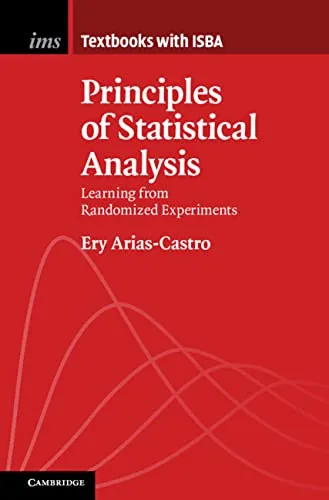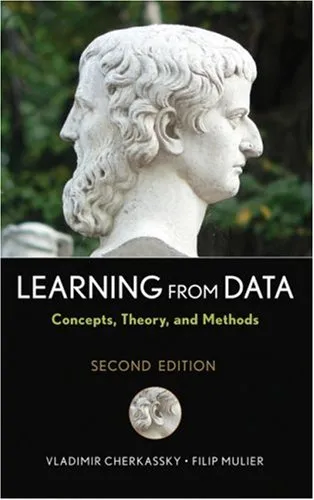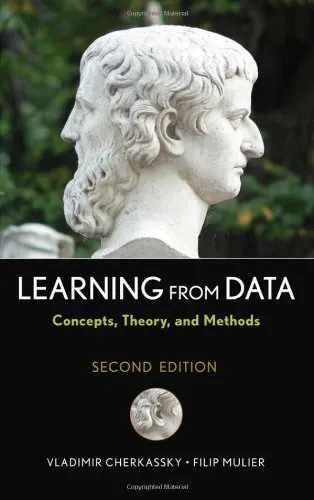Principles of Statistical Analysis: Learning from Randomized Experiments (Institute of Mathematical Statistics Textbooks)
4.3
بر اساس نظر کاربران

شما میتونید سوالاتتون در باره کتاب رو از هوش مصنوعیش بعد از ورود بپرسید
هر دانلود یا پرسش از هوش مصنوعی 2 امتیاز لازم دارد، برای بدست آوردن امتیاز رایگان، به صفحه ی راهنمای امتیازات سر بزنید و یک سری کار ارزشمند انجام بدینکتاب های مرتبط:
معرفی کتاب
کتاب اصول تحلیل آماری: آموزههایی از آزمایشهای تصادفی نوشته اری آریاس-کاسترو در تلاش است تا اصول بنیادی و کاربردهای عملی تحلیل آماری را با تمرکز ویژه بر آزمایشهای تصادفی ارائه دهد. این کتاب به عنوان یک منابع جامع آموزشی در زمینه آمار، به دانشجویان و پژوهشگران کمک میکند تا با روشهای مختلف طراحی و تحلیل آزمایشها آشنا شوند.
خلاصهای از کتاب
در این کتاب، نویسنده به بررسی نقش آزمایشهای تصادفی در فهم و تحلیل دادهها پرداخته و نشان میدهد که چگونه میتوان از این روشها برای اجرای تحلیلهای آماری واقعی و دقیق استفاده کرد. کتاب از هفت بخش اصلی تشکیل شده است که هر کدام به طرحریزی یک مبحث کلیدی در حوزه آمار میپردازد.
بخش اول به معرفی اصول اصلی طراحی آزمایشها میپردازد. این بخش روشهای مختلف تصادفیسازی را توضیح میدهد و به ذکر مزایا و معایب هر یک میپردازد. در بخش دوم، انواع تحلیلهای آماری مانند ANOVA و تحلیلهای رگرسیونی مطرح میشوند. بخشهای بعدی به طور خاص بر روی روشهای جمعآوری دادهها، مدیریت و تحلیل دادههای پیچیده تمرکز دارند.
نویسنده در هر فصل، با ارائه مثالهای کاربردی و واقعی، به تفصیل روشهای تحلیل آماری را بررسی میکند و نتایجی که میتوان از دادهها به دست آورد را توضیح میدهد. این رویکرد عملی و کاربردی کمک میکند تا دانشجویان و پژوهشگران نه تنها مفاهیم تئوریک را بیاموزند، بلکه نسبت به چگونگی اجرای آنها در شرایط واقعی نیز آگاهی پیدا کنند.
نکات کلیدی
- اهمیت تصادفیسازی در طراحی آزمایشها برای کاهش اریبی (Bias).
- نقش و تأثیر اندازه نمونه در دقت آماری و اعتبار نتایج.
- کاربرد توزیعهای آماری مانند Normal و Bernoulli در تحلیل دادهها.
- اهمیت استفاده از نرمافزارهای آماری برای تحلیل دادههای گسترده و پیچیده.
- استفاده از روشهای نوین نظیر Bootstrap و Resampling Techniques.
جملات معروف از کتاب
"آموزش آمار نه تنها شامل یادگیری فرمولها و تکنیکها، بلکه درک عمیق از اصول زیرسلطانی دادهها است."
"تصادفیسازی کلید باز کردن قفل دنیای پیچیدهٔ دادهها است."
چرا این کتاب مهم است
کتاب اصول تحلیل آماری: آموزههایی از آزمایشهای تصادفی یکی از منابع اصلی و معتبر در زمینه آموزش آمار است که به دلیل روششناسی دقیق و مثالهای کاربردی و کاربردی، ارزش زیادی در آموزش و پژوهش دارد. این کتاب به دانشجویان و اساتید این امکان را میدهد تا با استفاده از ابزارهای پیشرفته، تحلیلهای آماری خود را با دقت و صحت بالا انجام دهند. همچنین، با پرداختن به جدیدترین تکنیکها و روشهای موجود، خوانندگان را با راهکارهای نوین در مواجهه با چالشهای پیشرو در تحلیل دادهها آشنا میکند.
Introduction
Welcome to the structured world of statistical analysis with Principles of Statistical Analysis: Learning from Randomized Experiments. Designed as a part of the prestigious Institute of Mathematical Statistics Textbooks series, this book offers an intricate dive into the methodologies, principles, and application of statistical analysis within the sphere of randomized experiments. As a keystone for students, researchers, and professionals alike, its aim is to build a solid foundation in understanding how data is used to derive meaningful conclusions in various experimental settings.
Detailed Summary of the Book
The book embarks on a journey through the core principles of statistical analysis, starting with an overview of randomization and its historical significance. By emphasizing the importance of controlled experiments, it sketches the landscape of modern statistical methods used for systematic investigation. Each chapter integrates theory with practical examples, carefully aligning with real-world scenarios to engage the reader from a scholarly and practical standpoint.
Delving into various experimental designs, the book discusses their respective strengths, weaknesses, and suitable applications. You'll find discussions on completely randomized designs, block designs, factorial experiments, and more. These designs are meticulously explored to showcase how statistical efficiency and interpretability can be maximized. Emphasis is given to the proper execution and analysis of these designs through statistical software.
Finally, the book closes with reflections on ethical considerations and the future of experimental research, urging a thoughtful approach to statistical practice. This section is vital for maintaining integrity and trustworthiness in scientific endeavors.
Key Takeaways
- Understand the underlying principles and significance of randomization in statistical experiments.
- Get to know various experimental designs and how to choose the most suitable one for your research.
- Learn practical approaches to data analysis with the help of comprehensive examples and case studies.
- Explore ethical considerations and ensure the integrity of your experimental research.
Famous Quotes from the Book
"The art of undertaking an experiment resides in its careful design, ensuring that the maximum amount of information can be extracted from the minimum amount of effort."
"Randomization isn't just a technique—it's a perspective shift in approaching statistical validation, fostering a fair and unbiased analysis."
Why This Book Matters
In an era where data-driven decision-making is paramount, Principles of Statistical Analysis becomes a vital resource. It bridges the gap between complex statistical theory and practical application, enabling readers to execute statistically sound experiments. This book is essential for a world progressively leaning on empirical evidence, equipping readers with tools for effective analysis amidst varying levels of uncertainty and noise in experimental data.
Moreover, it instills a sense of responsibility in conducting research, ensuring ethical precedents are maintained alongside statistical integrity. By fostering a deeper understanding of experimental statistics, this book paves the way for innovative exploration and robust conclusions in diverse fields ranging from medicine to social sciences.
دانلود رایگان مستقیم
شما میتونید سوالاتتون در باره کتاب رو از هوش مصنوعیش بعد از ورود بپرسید
دسترسی به کتابها از طریق پلتفرمهای قانونی و کتابخانههای عمومی نه تنها از حقوق نویسندگان و ناشران حمایت میکند، بلکه به پایداری فرهنگ کتابخوانی نیز کمک میرساند. پیش از دانلود، لحظهای به بررسی این گزینهها فکر کنید.
این کتاب رو در پلتفرم های دیگه ببینید
WorldCat به شما کمک میکنه تا کتاب ها رو در کتابخانه های سراسر دنیا پیدا کنید
امتیازها، نظرات تخصصی و صحبت ها درباره کتاب را در Goodreads ببینید
کتابهای کمیاب یا دست دوم را در AbeBooks پیدا کنید و بخرید
1246
بازدید4.3
امتیاز0
نظر98%
رضایتنظرات:
4.3
بر اساس 0 نظر کاربران
Questions & Answers
Ask questions about this book or help others by answering
No questions yet. Be the first to ask!














